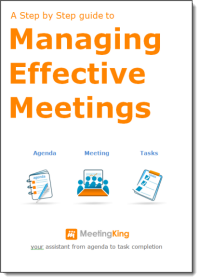
When we organize or attend meetings, we expect them to be well thought out, efficient, and bring value to everyone involved. We want meetings to be worth our valuable time.
Preparing a meeting agenda ahead of time and sharing it with other participants can help to achieve maximum potential. In fact, a clear agenda is a cornerstone of any successful meeting, and not having one is like going to an exam without studying for it.
What is a meeting agenda?
A meeting agenda is a document that lists topics, like talking points and action items, that need to be discussed during an upcoming meeting. It should be shared beforehand with all the participants and include an overall framework of the meeting, the people responsible for certain actions, and an estimated timeframe for each discussion point.
Let’s look into 5 key reasons why having a meeting agenda is so important.
1. Meeting Agenda Sets the Intention
The main purpose of having a meeting agenda is to define the goal of a meeting. An agenda for a meeting is like a table of contents in a book. It helps to orientate participants by giving structure and showing what to expect. Consequently, when everyone has clarity on the reasons behind their meeting, it will be more productive.
2. Meeting Agenda Encourages Contribution
Preparing and sharing a meeting agenda beforehand is an incredibly effective way to encourage attendees to contribute to the discussion. When your colleagues are informed about the talking points in advance, they can come prepared and ready to share their ideas, concerns, or questions. As a result, your meeting will be more constructive and proactive.
3. Meeting Agenda Creates a Roadmap
It is easy to get distracted and go off-topic when you do not have a guiding document to lead the conversation. A well-structured meeting agenda will keep you on track and ensure that every important matter is discussed. It will prevent having to schedule any additional meetings because you forgot to ask your colleagues about the upcoming project or if too much time was spent talking about non-work-related things such as what everybody was doing at the weekend.
4. Meeting Agenda Provides Documentation
Each day brings multiple things you have to remember to take care of. Some of your goals for the day ahead can become mixed up or forgotten if you do not have some form of notes to keep track of these matters (Learn more about getting things done here.)
The last thing you want to do is add to your busy work schedule by having to repeat talking points or have to ask your colleagues about decisions that were made during an important meeting. This is where having a meeting agenda really starts to make sense.
You can use it as a reference point and a reminder of the subjects that were discussed, the next steps to be taken, and delegate the best people to take responsibility for them.
5. Meeting Agenda Defines Responsibilities
A meeting agenda that you can share with all the attendees can provide an outline of the responsibilities that each person has before the meeting.
This way, everyone has the same information on who is accountable for what and when the tasks need to be completed. Having an agenda prevents any confusion or misunderstandings that might arise if such information is not recorded.
In Summary
A well-structured meeting agenda shared prior to the meeting not only saves time but more importantly, sets the framework for the flow of conversation. It also increases the chances of participants being proactive and keeps them accountable.
At MeetingKing we can help you prepare your meeting agenda easily and efficiently. Furthermore, if you are not sure what an agenda should include, have a look at different types of meeting agenda templates that we created to make your meetings go smoothly.
___
The image above by Freepik


